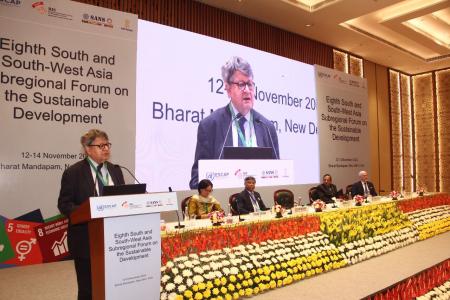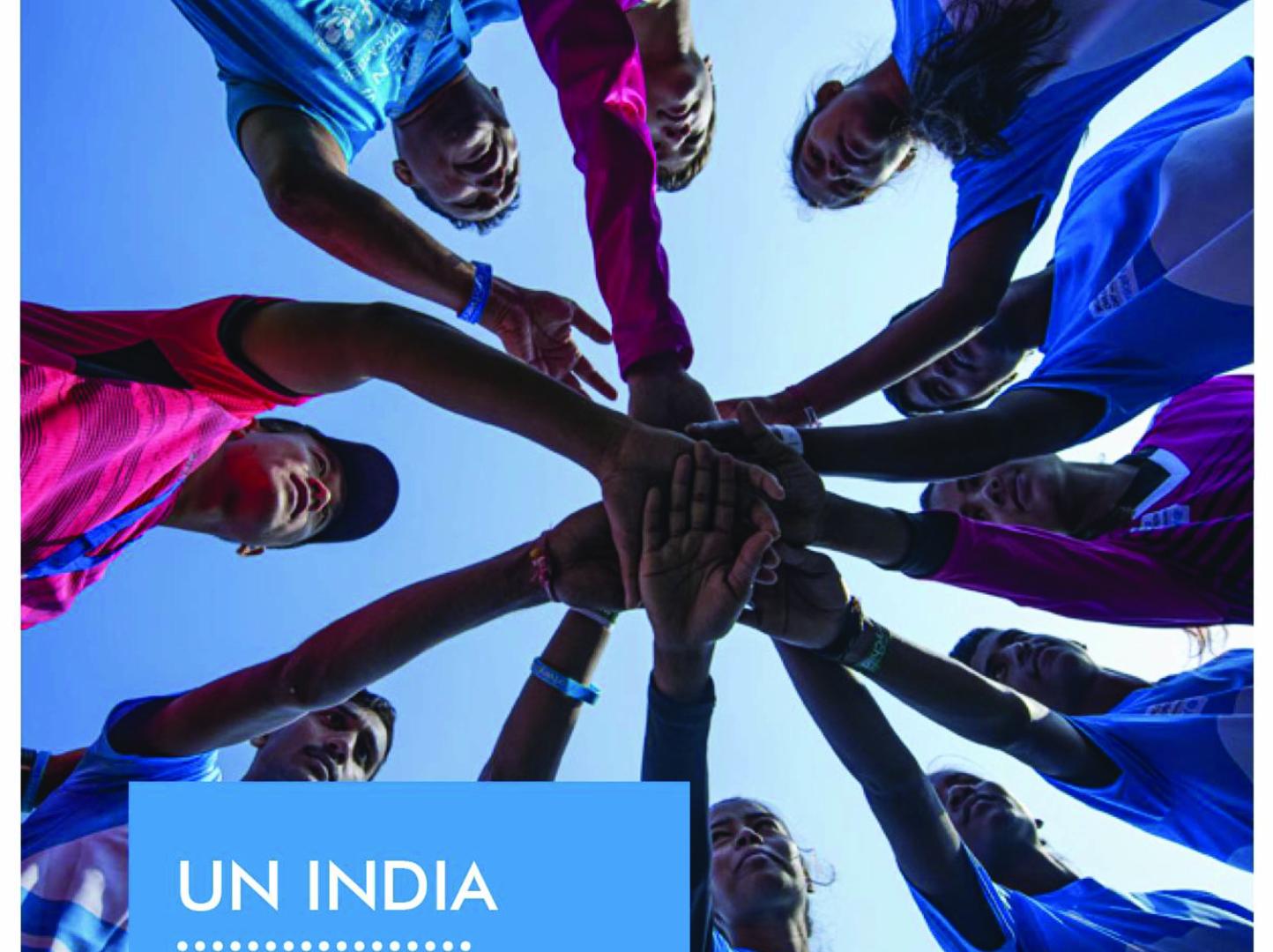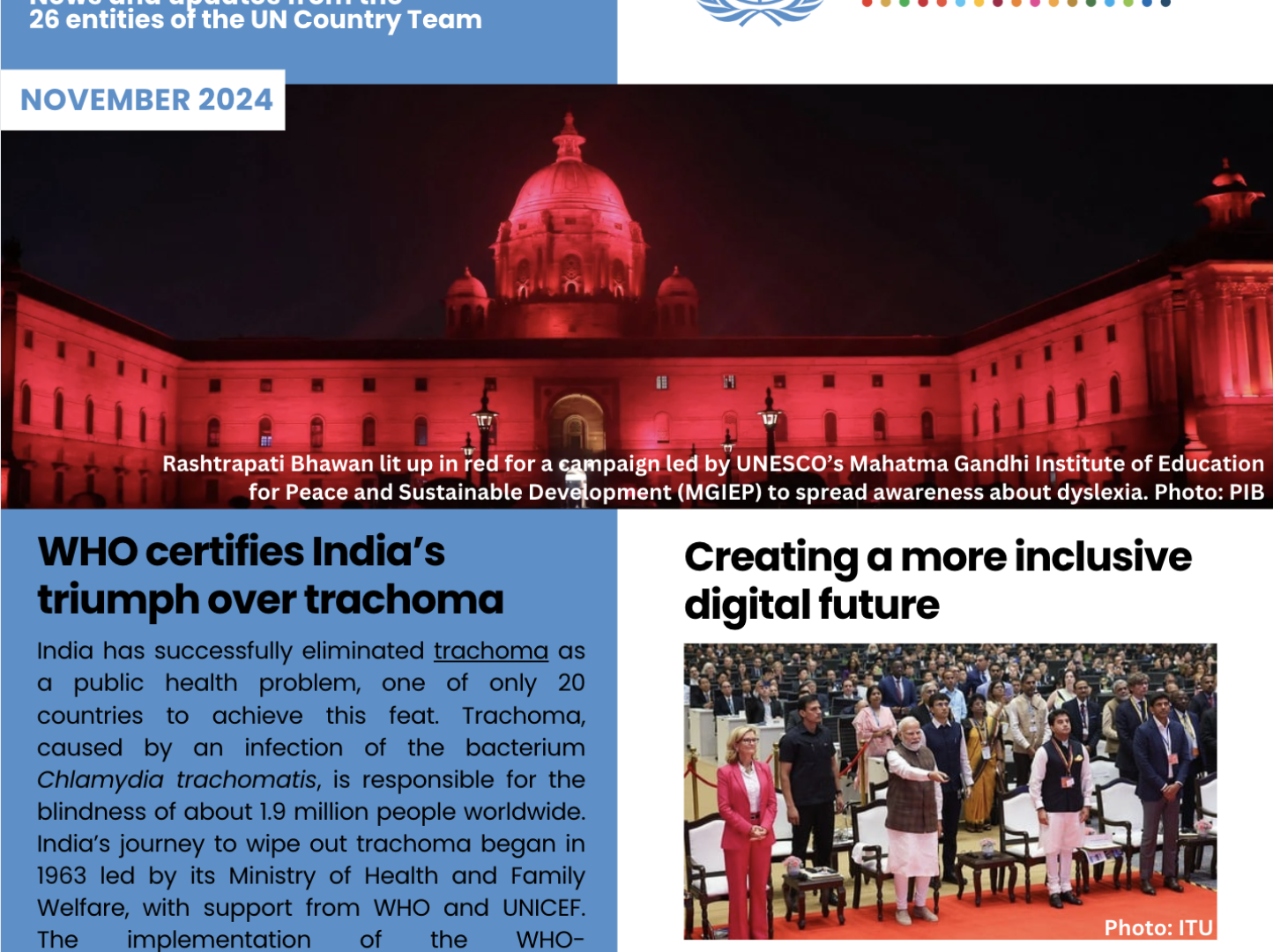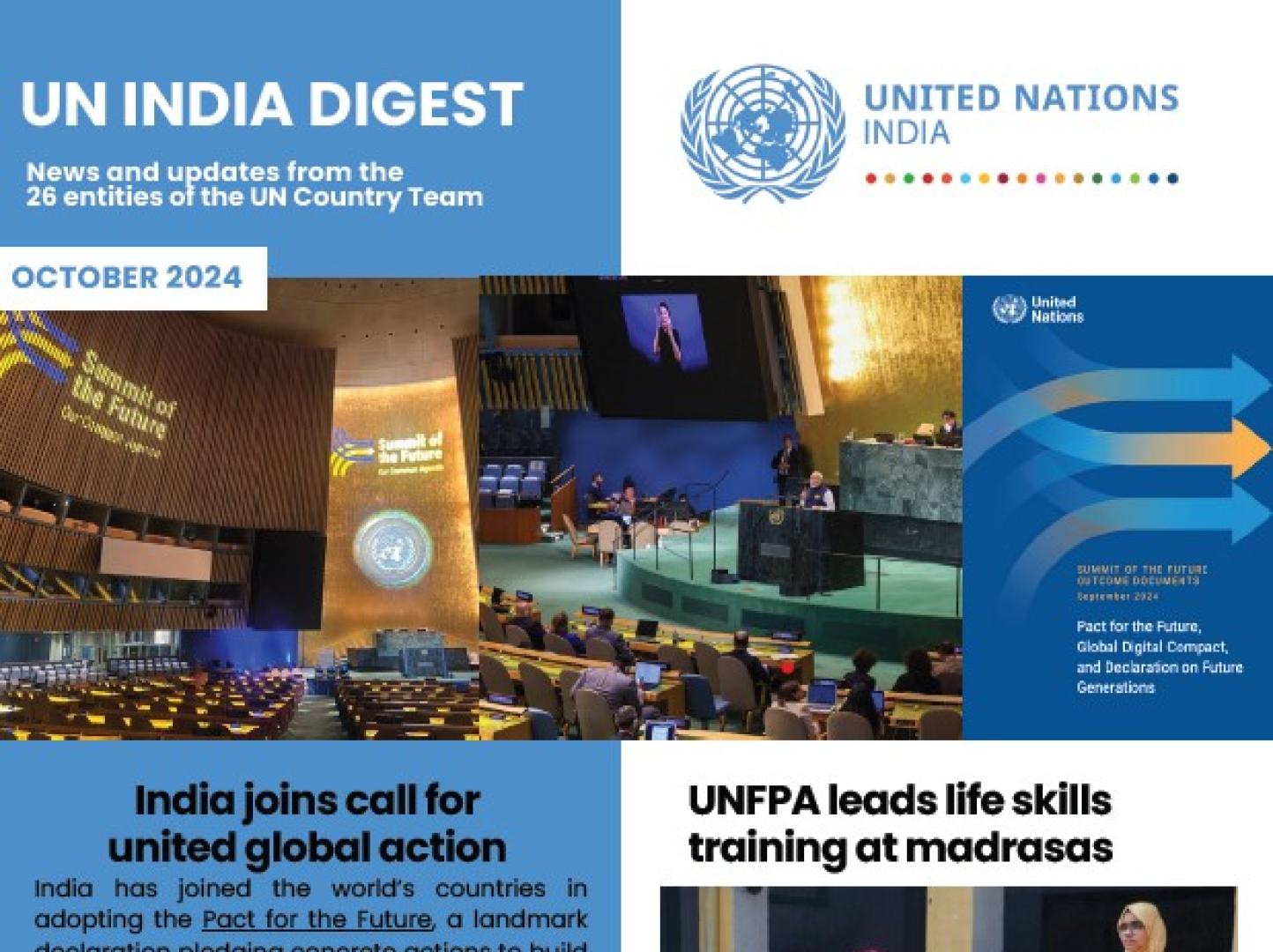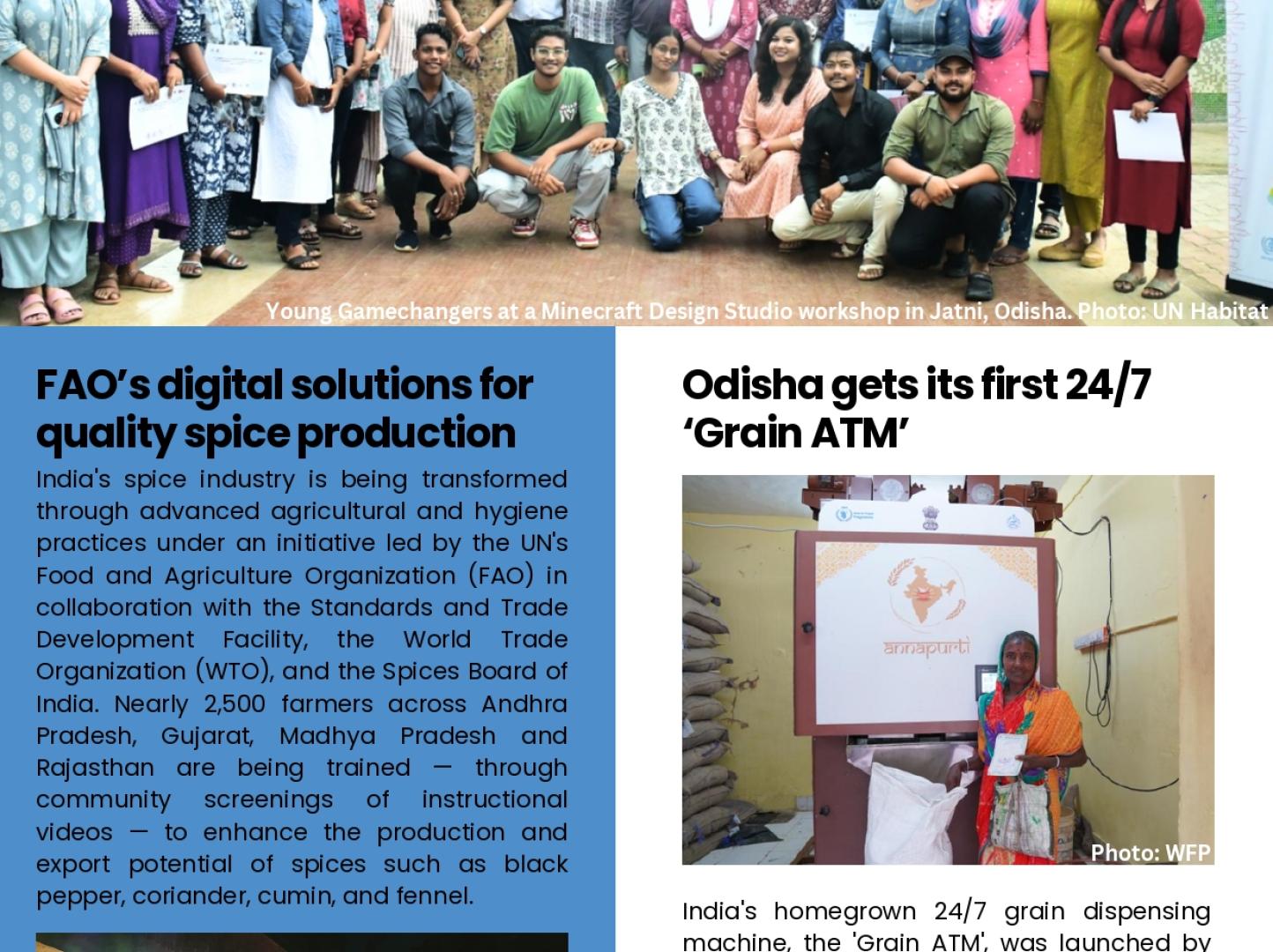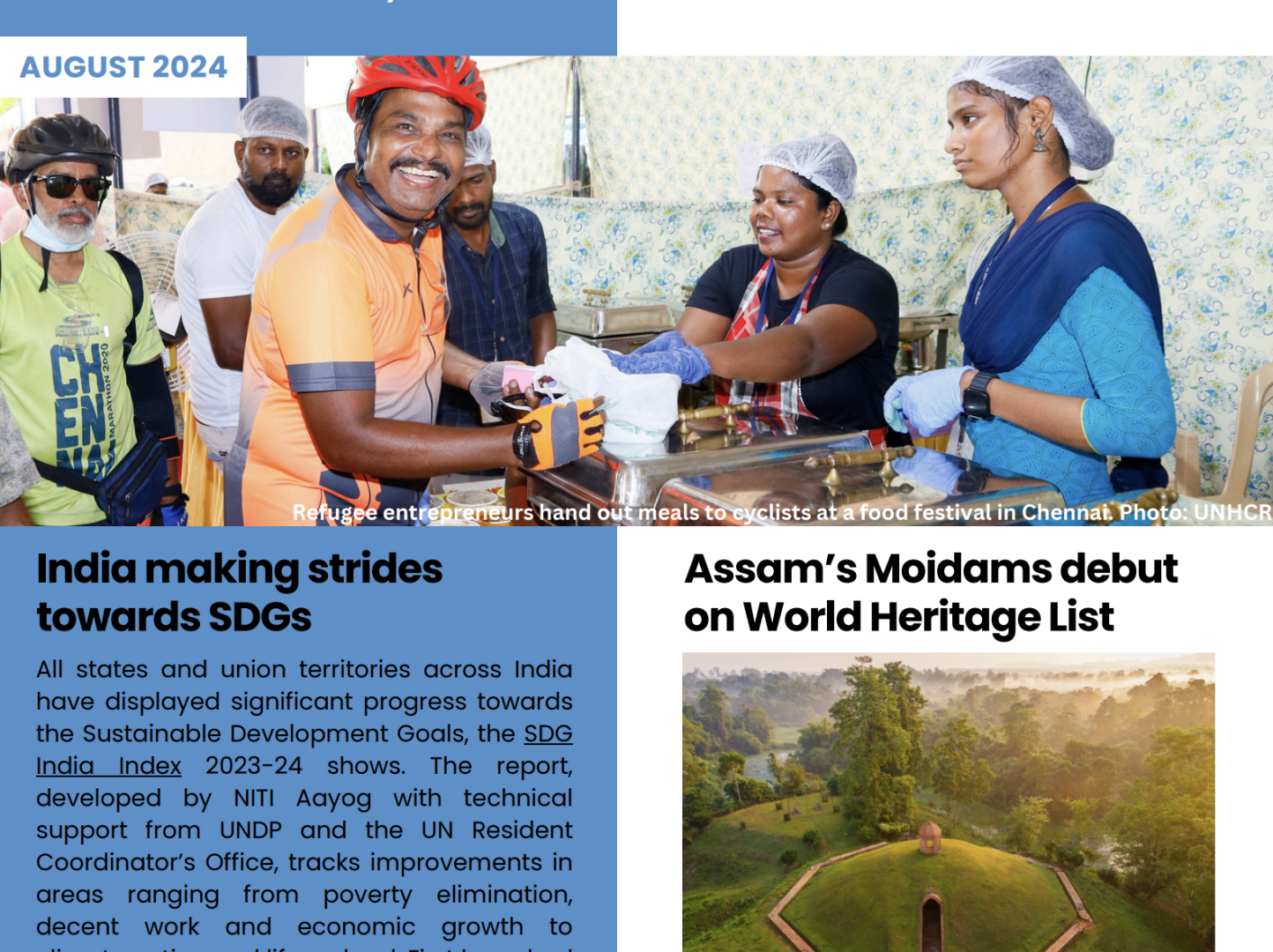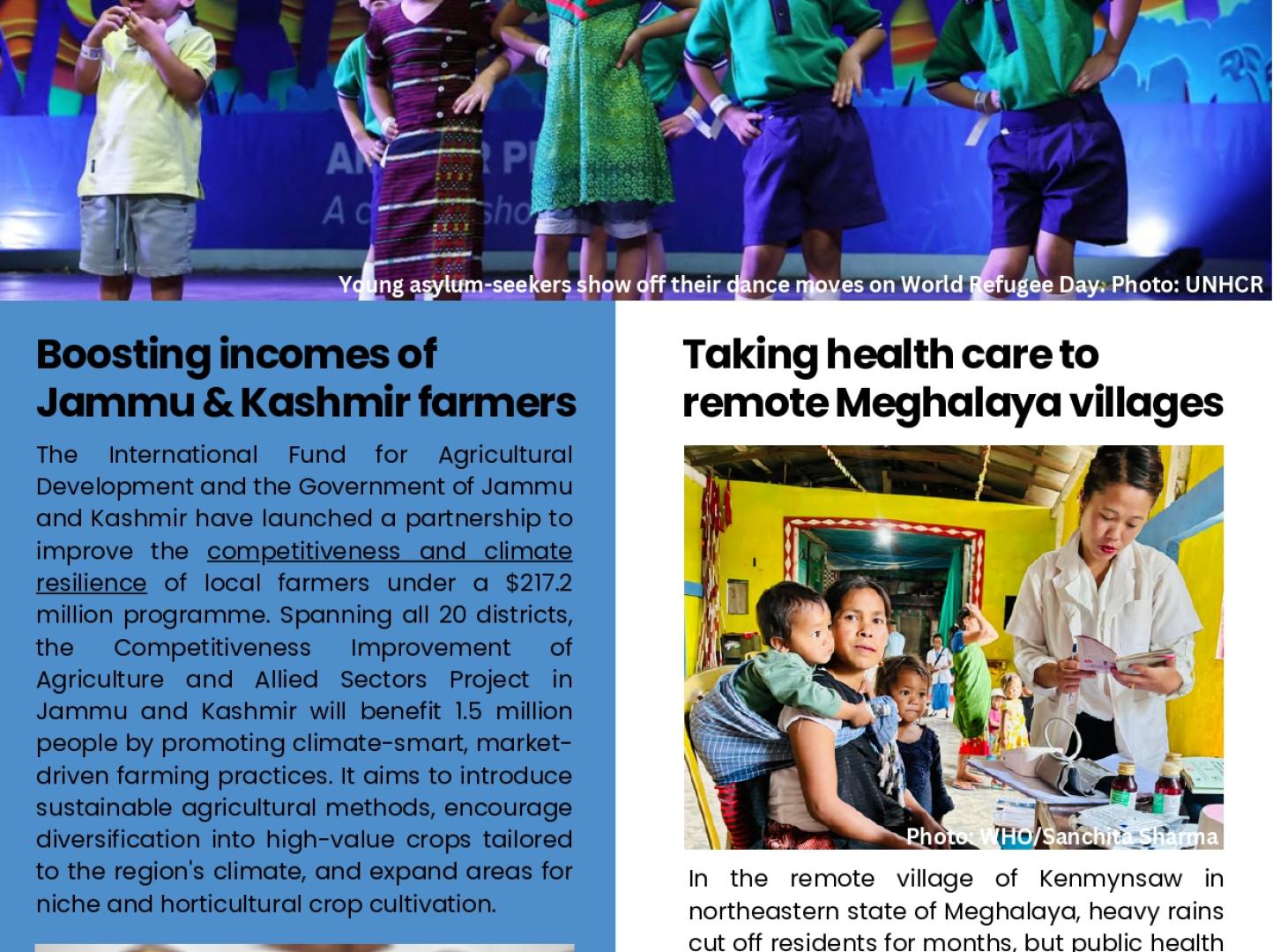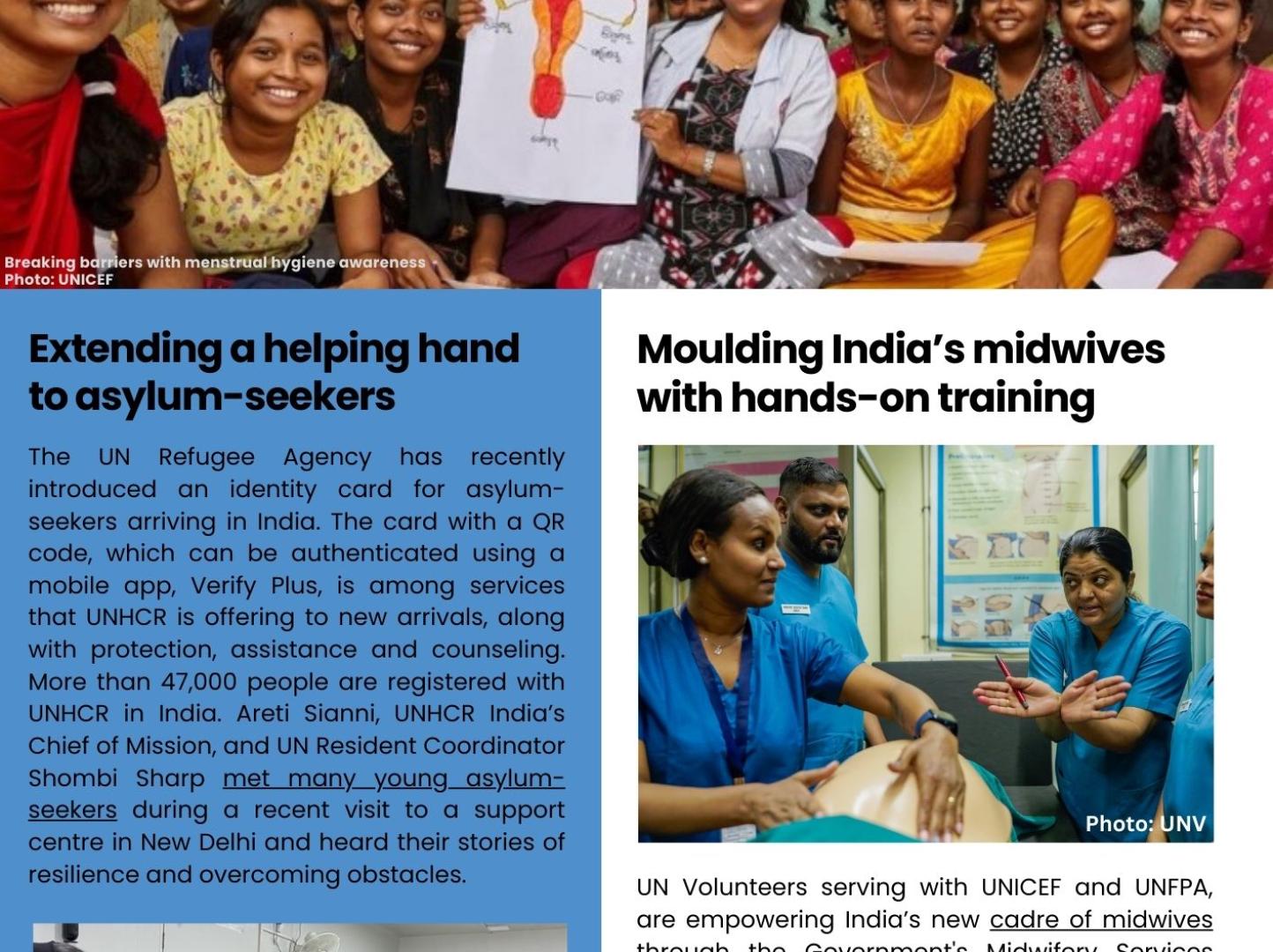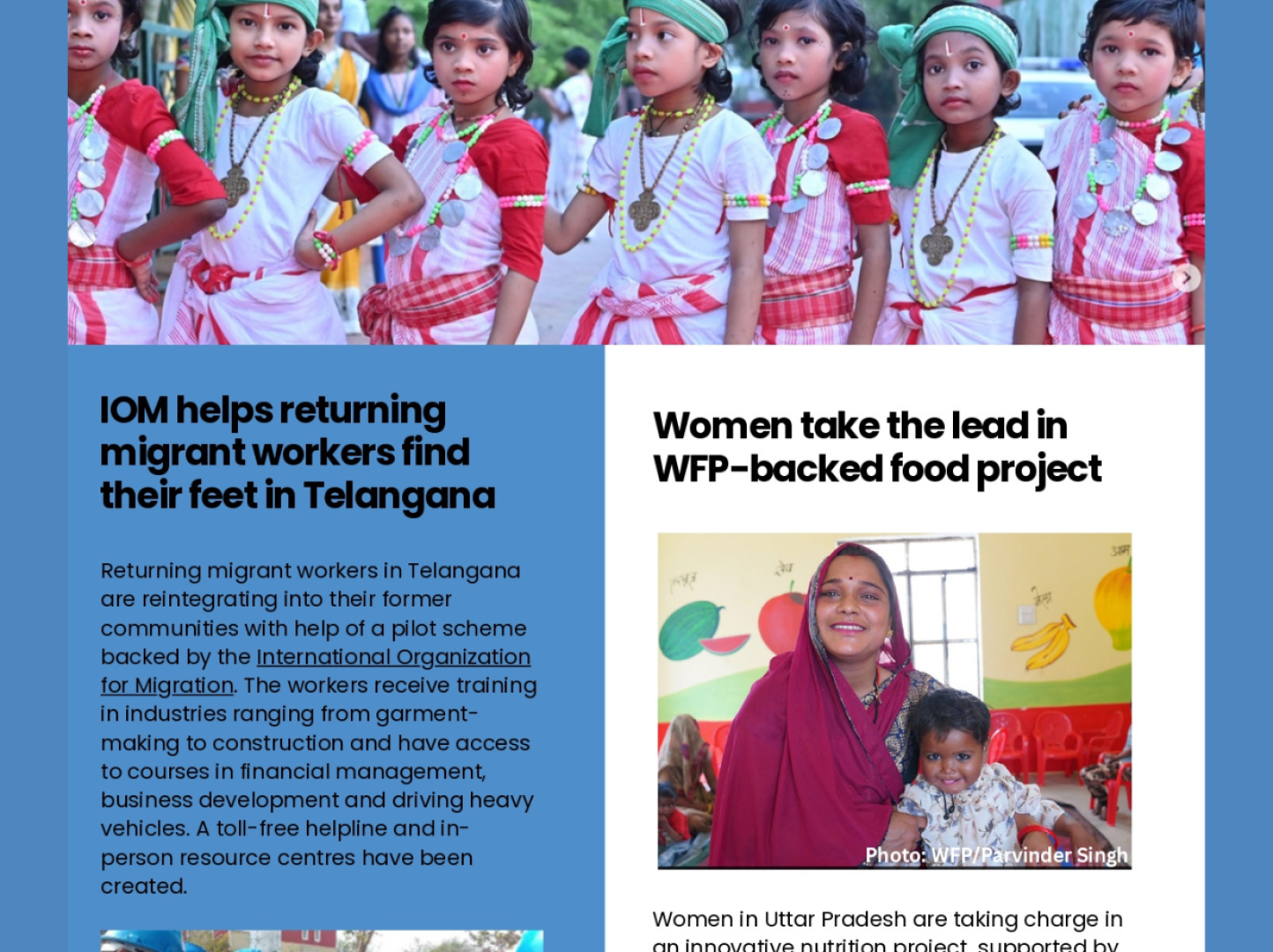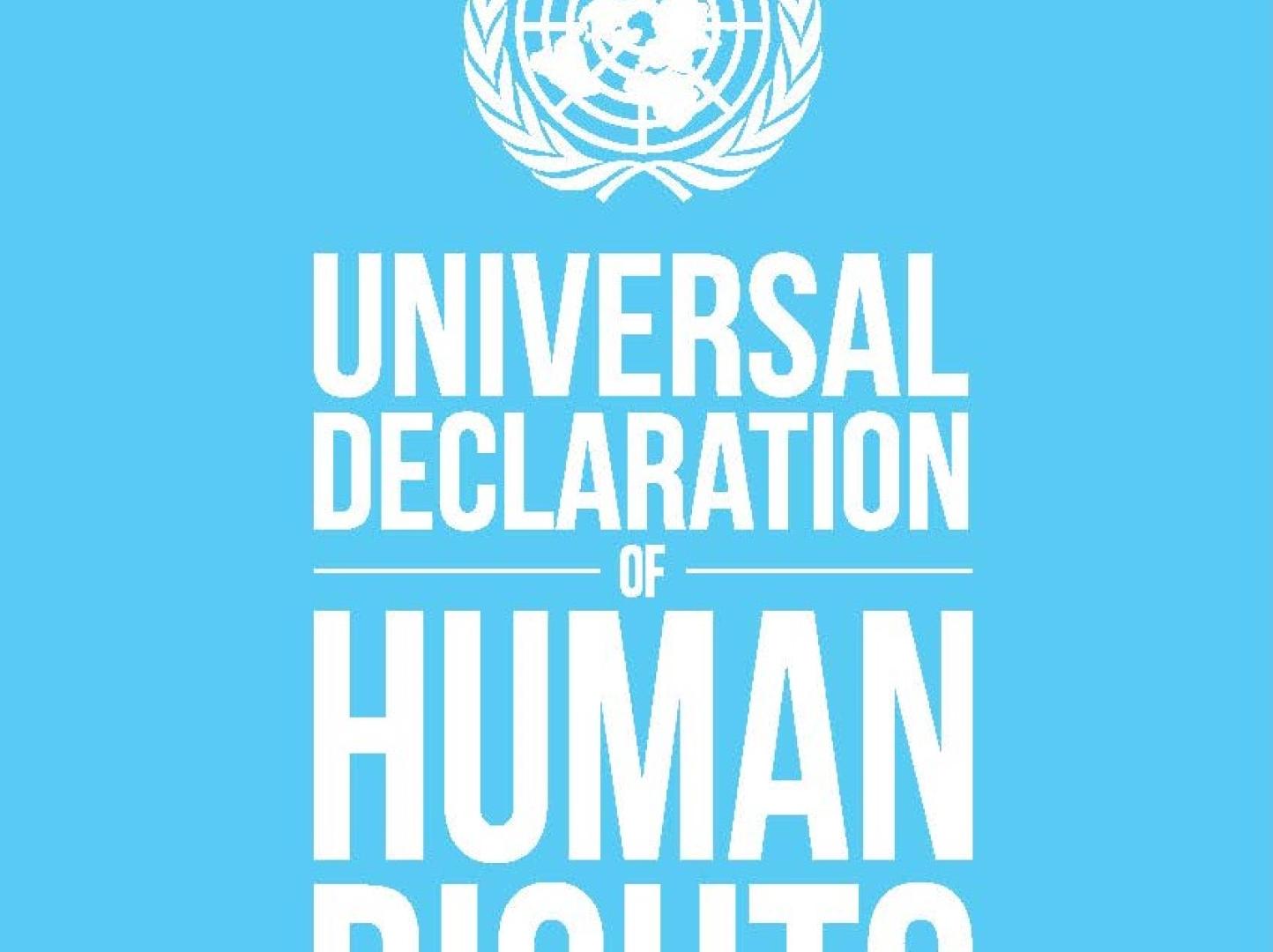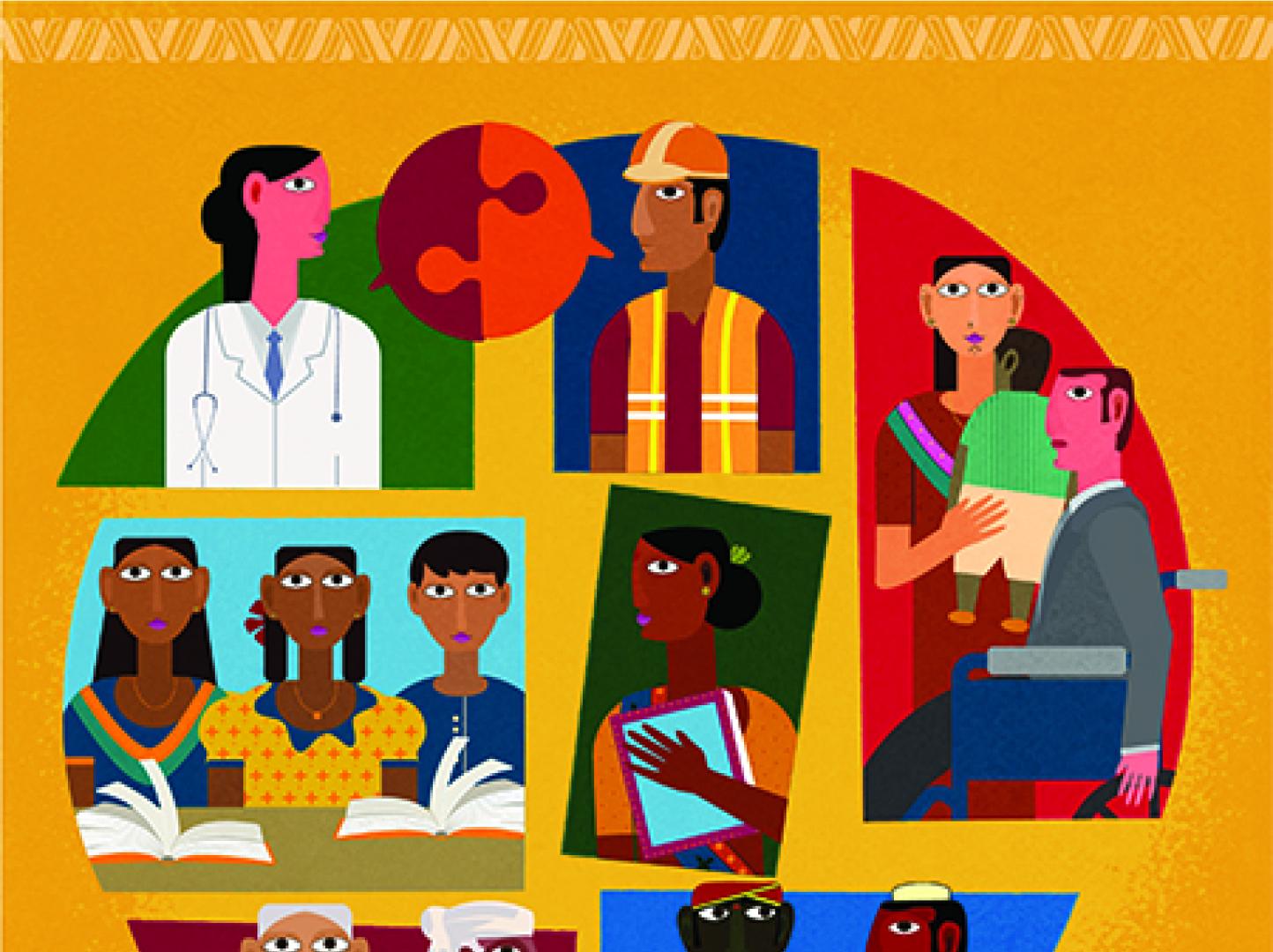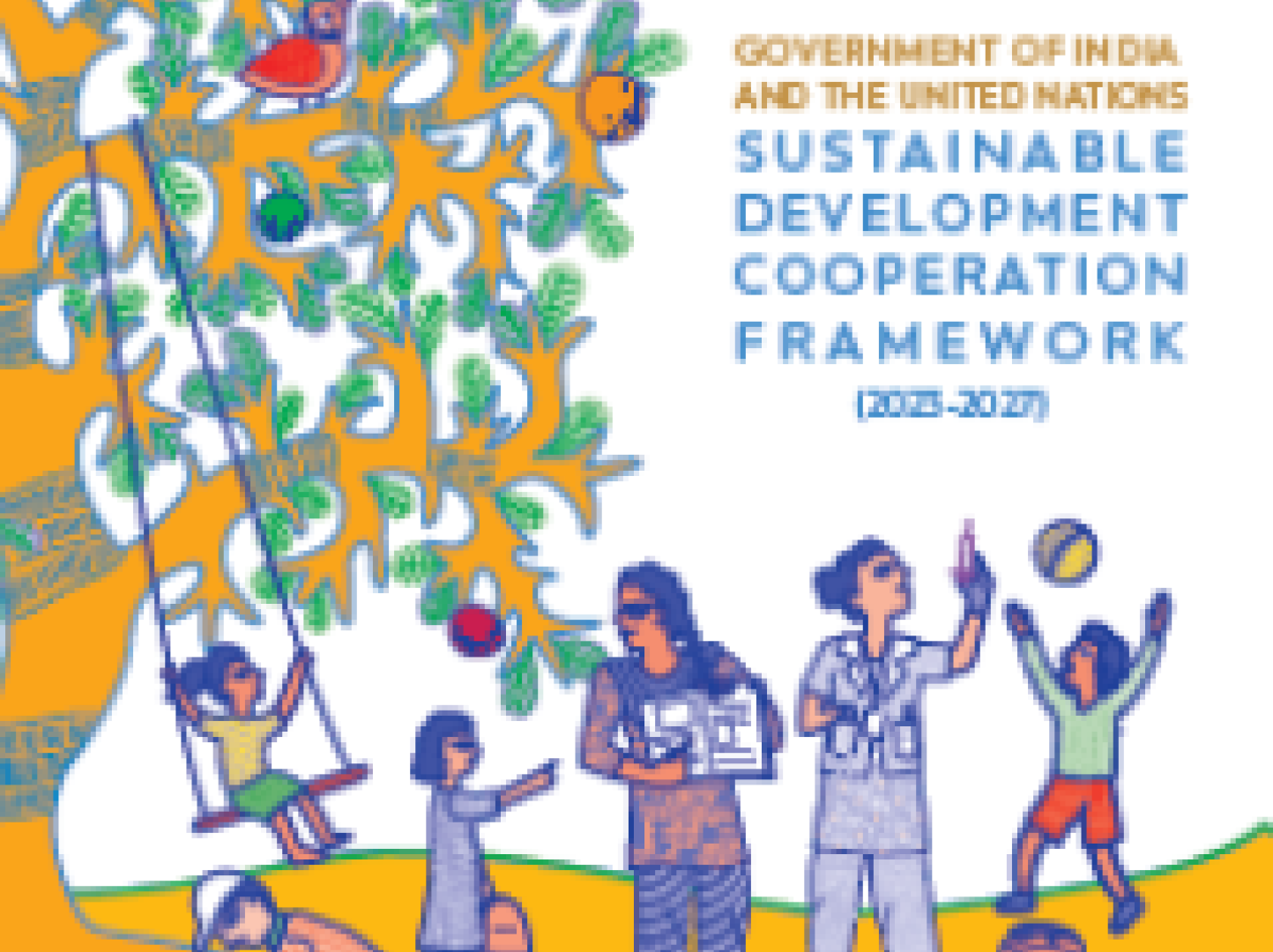Latest
The Sustainable Development Goals in India
India is critical in determining the success of the SDGs, globally. At the UN Sustainable Development Summit in 2015, Prime Minister Narendra Modi noted, “Sustainable development of one-sixth of humanity will be of great consequence to the world and our beautiful planet. It will be a world of fewer challenges and greater hope; and, more confident of its success”. NITI Aayog, the Government of India’s premier think tank, has been entrusted with the task of coordinating the SDGs, mapping schemes related to the SDGs and their targets, and identifying lead and supporting ministries for each target. In addition, the Ministry of Statistics and Programme Implementation (MoSPI) has been leading discussions for developing national indicators for the SDGs. State governments are key to India’s progress on the SDGs as they are best placed to ‘put people first’ and to ensuring that ‘no one is left behind’. The UN Country Team in India supports NITI Aayog, Union ministries and state governments in their efforts to address the interconnectedness of the goals, to ensure that no one is left behind and to advocate for adequate financing to achieve the SDGs.
Publication
12 November 2024
UN in India Digest November 2024
WHO lauds India's elimination of trachoma, eight new resolutions adopted at the ITU World Telecommunication Standardization Assembly, glimpses of the UN Day celebrations in New Delhi and more updates from the 26 entities of the UN country team in this special edition of the United Nations in India newsletter.
1 of 5
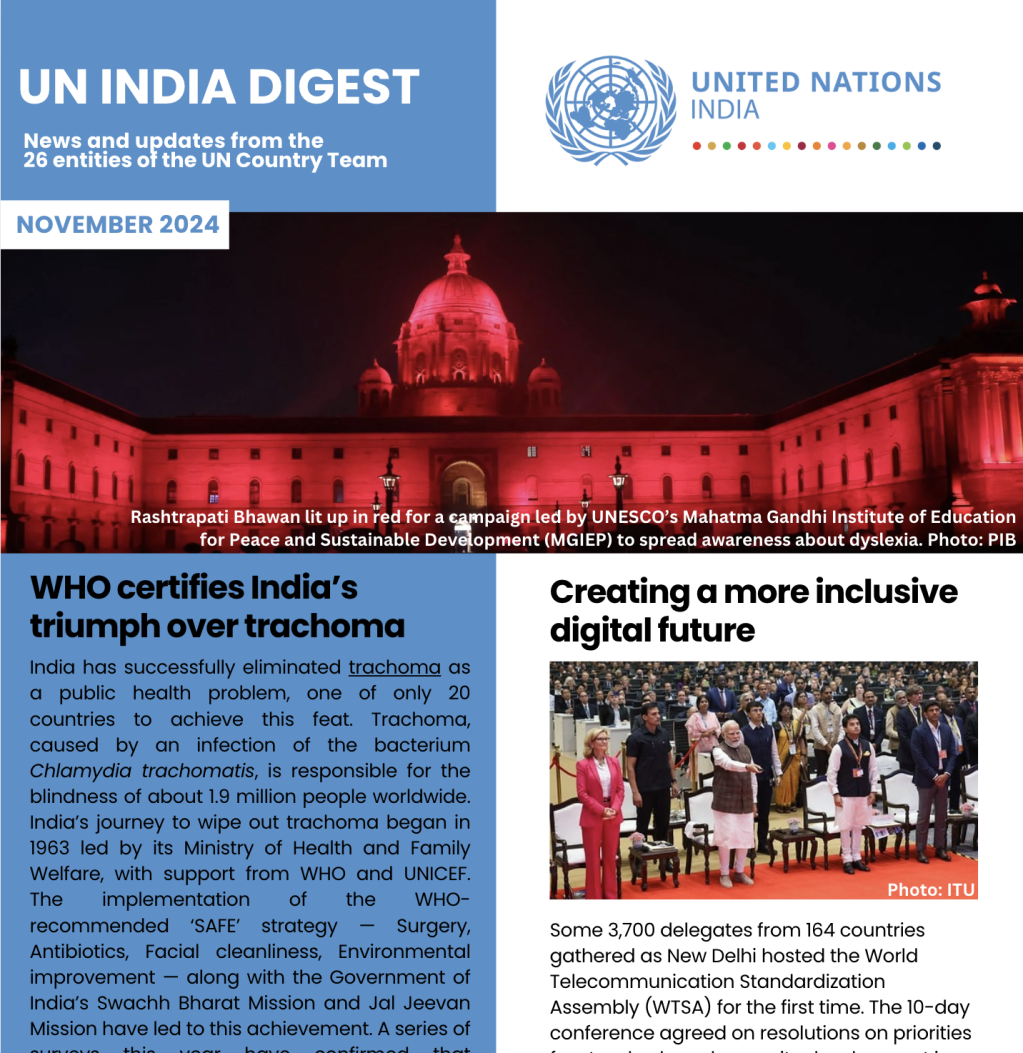
Story
01 October 2024
World leaders pledge action on humanity’s biggest challenges
India has joined the world’s countries in adopting the Pact for the Future, a landmark declaration pledging concrete actions towards a safer, more peaceful, sustainable and inclusive world for future generations. Meeting at UN Headquarters in New York on 22 September for the Summit of the Future, world leaders adopted the Pact – along with the Global Digital Compact and the Declaration on Future Generations – by consensus.By endorsing the Pact, UN Member States agreed to turbo-charge efforts to achieve the Sustainable Development Goals (SDGs) and fulfil the terms of the 2015 Paris Agreement on climate change. Leaders pledged to listen more to young people and include them in decision-making, while also building stronger relationships with civil society, the private sector, and local and regional authorities. They further committed to intensifying efforts to protect civilians in armed conflict and address the root causes of these conflicts.The Pact has five broad focus areas: sustainable development; international peace and security; science and technology; youth and future generations; and transforming global governance. The Global Digital Compact outlines commitments to ensure that digital technologies contribute to sustainable development and human rights, while addressing risks like digital divides, cybersecurity, and the misuse of technology. Governments are now obligated to form an impartial worldwide Scientific Panel on AI and start an international conversation about AI governance inside the UN. The Declaration on Future Generations focuses on securing the well-being of future generations and highlighting the need to include their interests in decision-making. These three documents were adopted following months of intergovernmental negotiations. Speaking afterwards, Philémon Yang, President of the General Assembly, urged countries to move forward in a spirit of solidarity.“The path we choose must lead to a future where human dignity is respected and human rights are upheld,” he said. “A future where peace transcends the mere absence of conflict and is grounded in justice, inclusion, and equity.” UN Secretary-General António Guterres stressed that “people everywhere are hoping for a future of peace, dignity and prosperity. They are crying out for global action to solve the climate crisis, tackle inequality, and address new and emerging risks that threaten everyone.”He added that people “see the United Nations as essential to solving these challenges.” Indian Prime Minister Narendra Modi, speaking at the Summit of the Future, said that “global action must match global ambition” when it comes to tackling emerging sources of threat such as the cyber, maritime and space fields.“The success of humanity lies in our collective strength, not in the battlefield,” he said. “And for global peace and development, reforms in global institutions are essential.”
1 of 5

Story
16 October 2024
Global conference begins on future of digital tech standards
Thousands of tech experts, industry leaders, policymakers, researchers and government officials have gathered in New Delhi for a global United Nations-run conference on the future of technology standards. The World Telecommunication Standardization Assembly (WTSA) formally opened on 15 October in the capital’s Bharat Mandapam venue with an opening ceremony featuring Indian Prime Minister Narendra Modi. WTSA, taking place in the Asia-Pacific region for the first time, runs until 24 October. It is being held alongside the India Mobile Congress. Held every four years, WTSA sets out priorities for experts around the world who work year-round to develop the standards established by the UN’s International Telecommunication Union (ITU). The assembly’s opening heard calls for universal connectivity, the need for ethical artificial intelligence (AI) and how digital inclusion can make a meaningful difference to people’s lives.
In his remarks, Mr. Modi stressed that “security, dignity and equity” are the principles on which discussions at the assembly and congress should be based.
“Our objective should be that no country, no region and no community should be left behind the in this digital era,” he said.
ITU Secretary-General Doreen Bogdan-Martin said the world had a lot to learn from what India has already accomplished with its digital public infrastructure. “This global gathering calls for bold, collective action. In the next 10 days, we can strengthen the role of international standards as the bedrock of global digital governance,” she said.
ITU's standardization work is driven by the contributions and consensus decisions of the agency’s membership, which includes 194 Member States and more than 1,000 member companies, universities, and international and regional organizations.
WTSA reviews the strategy, structure and working methods of ITU's standardization arm every four years. It also approves the mandates and appoints the leadership teams of expert groups for international standardization.
***
In his remarks, Mr. Modi stressed that “security, dignity and equity” are the principles on which discussions at the assembly and congress should be based.
“Our objective should be that no country, no region and no community should be left behind the in this digital era,” he said.
ITU Secretary-General Doreen Bogdan-Martin said the world had a lot to learn from what India has already accomplished with its digital public infrastructure. “This global gathering calls for bold, collective action. In the next 10 days, we can strengthen the role of international standards as the bedrock of global digital governance,” she said.
ITU's standardization work is driven by the contributions and consensus decisions of the agency’s membership, which includes 194 Member States and more than 1,000 member companies, universities, and international and regional organizations.
WTSA reviews the strategy, structure and working methods of ITU's standardization arm every four years. It also approves the mandates and appoints the leadership teams of expert groups for international standardization.
***
1 of 5
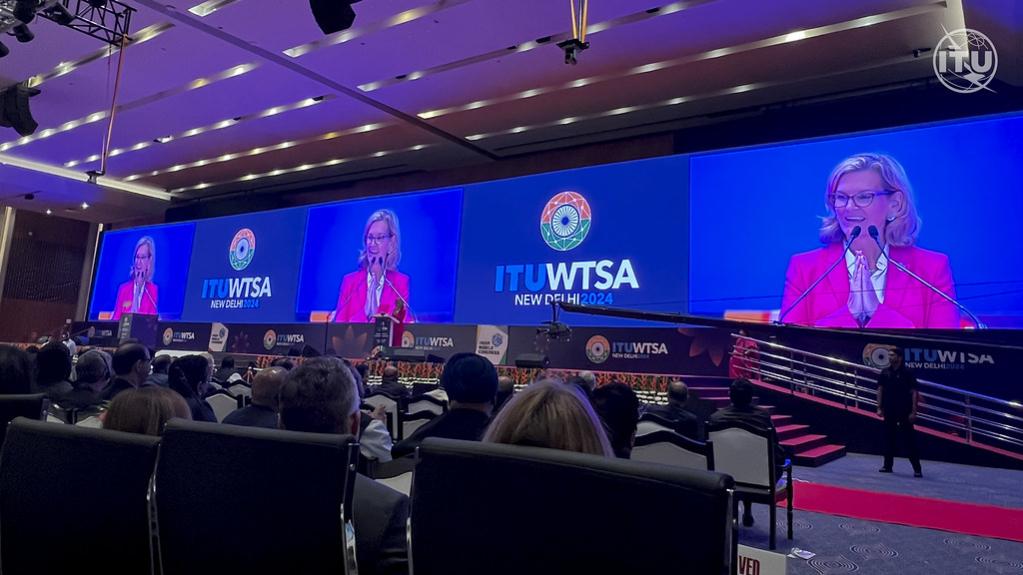
Story
01 October 2024
Global leaders gather at time of ‘powder keg’
World leaders gathered at UN Headquarters in New York for the General Assembly’s high-level meeting amid warnings that the planet is becoming “a powder keg” on an unsustainable course.UN Secretary-General António Guterres, delivering his annual report on the UN’s work, noted the many raging conflicts around the world, including those in Gaza, Ukraine and Sudan. “Our world is a whirlwind,” he said. “We are in an era of epic transformation, facing challenges unlike any we have ever seen – challenges that demand global solutions.”The Secretary-General added that climate change, poverty and artificial intelligence were among the many other challenges facing the world today.“We are edging towards the unimaginable – a powder keg that risks engulfing the world,” he said.Mr. Guterres emphasized the need to tackle three main drivers of unsustainability in the world: impunity, inequality, and uncertainty.“These worlds of impunity, inequality and uncertainty are connected and colliding,” he said, adding that nevertheless the challenges are solvable if humanity is willing to ensure that “the mechanisms of international problem-solving actually solve problems.” General Assembly President Philémon Yang used his address to underline that the 193-member General Assembly remained “one of the world’s most inclusive, represented, representative and authoritative platforms for global reflection of collective action.”Mr. Yang said that “if we act together,” the world can still overcome its greatest challenges, including the attainment of the Sustainable Development Goals by their 2030 target date. Fewer than 17% of the SDG targets are currently on track, just six years before the deadline.He also underscored the threats posed by the climate crisis, which is impacting ecosystems and livelihoods worldwide. “The urgency of our task cannot be overstated.”
1 of 5
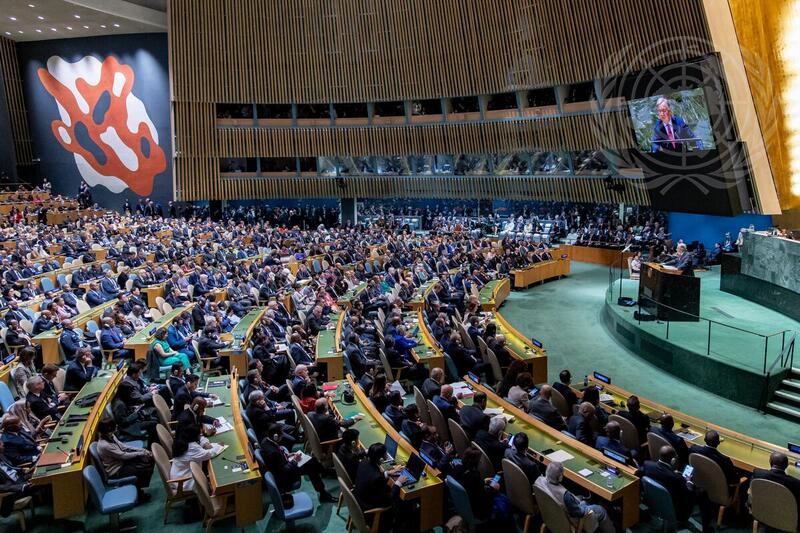
Story
03 August 2022
UN News Hindi website
Visit the UN News Hindi site for news, stories, opinions, interviews, videos and audio stories from across the UN system in Hindi: https://news.un.org/hi/
1 of 5

Story
27 November 2024
16 Days, One Goal: End Violence
It happens every ten minutes. Somewhere in the world, a woman’s life is stolen—not by disease or disaster, but by the hands of someone she trusted. A partner, a family member. Someone who was supposed to care for her.For thousands of women in 2023, their stories ended in violence. The cycle of abuse—silent in its beginnings, escalating in its cruelty—culminated in one final, irreversible act: femicide.Behind every statistic is a name. Behind every headline is a family forever changed. Yet, the epidemic of violence against women and girls remains one of the world’s most persistent, and solvable, crises. The Numbers Speak Louder Than WordsNearly one in three women experiences physical or sexual violence in her lifetime. One in four adolescent girls faces abuse at the hands of a partner. These are not abstract figures; they are lives interrupted, futures erased.And while the problem is global, it’s deeply personal. It happens in homes, in workplaces, in communities that claim to care for their own.The truth is stark: without addressing gender-based violence, we cannot achieve the world envisioned by the Sustainable Development Goals (SDGs). Gender equality—Goal 5—remains out of reach as long as women live in fear of violence.A Campaign of Hope and UrgencyThis year’s 16 Days of Activism Against Gender-Based Violence comes with a haunting reminder: “Every Ten Minutes, a Woman is Killed. #NoExcuse.”From 25 November, the International Day for the Elimination of Violence Against Women, to 10 December, Human Rights Day, the campaign calls on governments, organisations, and individuals to confront the reality of femicide and gender-based violence head-on.The urgency of this moment is amplified as the world approaches the 30th anniversary of the Beijing Declaration and Platform for Action in 2025. This visionary blueprint for achieving gender equality has been a rallying point for decades. But the question remains: are we doing enough to honour its promise? The Faces Behind the FiguresConsider Nadia, a 28-year-old mother of two. She was outgoing, loved to sing, and dreamed of opening her own bakery. But for years, she endured the sharp edges of her husband’s words, then his fists. She thought things would change. She stayed for her children.One evening, after an argument over something as trivial as a burnt dinner, Nadia became another statistic—one more woman lost to intimate partner violence.Nadia’s story is tragically common. It’s a story repeated every day, in every corner of the world. What Needs to Change?Violence against women doesn’t happen in isolation. It is rooted in inequality, silence, and a culture that too often excuses or minimises abuse. Change must happen on multiple fronts:Governments must enforce laws and policies that protect women and hold perpetrators accountable. Countries with comprehensive domestic violence laws report significantly lower rates of intimate partner violence (9.5%) than those without (16.1%).Communities must challenge harmful norms, support survivors, and speak out against abuse.Businesses can adopt zero-tolerance policies and create safe workplaces for women.Individuals—yes, you—can raise awareness, advocate for change, and support women’s organisations working on the front lines. A Future Without FearThis year’s 16 Days campaign is more than a call to action—it’s a plea for justice, for accountability, for change.Advocate for stronger laws. Speak out against harmful attitudes. Support survivor-centred services. And remember: behind every ten minutes is a life that could have been saved.Violence against women and girls is not inevitable. It is a choice society makes every day—whether to act or to stay silent.The time for silence is over. It’s time to stand up, speak out, and say together: #NoExcuse for violence against women. Disclaimer - Nadia’s story is fictional but reflects the experiences of countless women around the world. Every ten minutes, a woman loses her life to violence, often at the hands of someone she knows and trusts.
1 of 5

Story
19 November 2024
ESCAP forum urges urgent SDG action
In a powerful display of unity and urgency, representatives from South and South-West Asian countries gathered in New Delhi for the Eighth South and South-West Asia Subregional Forum on the Sustainable Development Goals (SDGs). The forum, held from November 12 to 14, served as both a platform for dialogue and a rallying cry for accelerated collective action to address the subregion's most pressing development challenges. Opening the forum, UN Under-Secretary-General and Executive Secretary of ESCAP Armida Salsiah Alisjahbana called for decisive action on key SDGs affecting health, gender equality, employment, life below water, and partnerships (SDGs 3, 5, 8, 14, and 17). “We must address multi-dimensional challenges to our health systems and ensure that women and girls have equal opportunities across all sectors,” Alisjahbana stated, emphasizing the need to prioritize youth employment for the region's young populations.Amid progress, forum participants noted persistent challenges, including climate impacts, natural disasters, and gaps in informal employment and gender equality. Discussions aimed to produce actionable recommendations on environmental protection, bridging the gender gap, youth employment, and safeguarding water resources, amongst others. Representing the host country, Suman Bery, Vice Chairman of NITI Aayog, underscored the role of government-private sector collaboration as essential for sustainable growth, especially for SDG 8 and SDG 17. “Achieving the 2030 Agenda requires ambitious, holistic approaches, recognizing the unique challenges faced by countries across the region,” Md. Golam Sarwar, Secretary General of the SAARC Secretariat added.UN Resident Coordinator in India Shombi Sharp highlighted India’s leadership in South-South cooperation through the SDG Index, a model that aligns national strategies with the global Goals. Organized by ESCAP in collaboration with the Government of India, the Research and Information System for Developing Countries, and the UN in India, this three-day forum is part of a broader initiative that spans five subregional meetings. Insights from these discussions will feed into the Asia-Pacific Forum on Sustainable Development (APFSD) and the UN High-Level Political Forum (HLPF) in 2025, helping set a course towards achieving the 2030 Agenda across Asia and the Pacific.As the forum concluded, a collective resolve emerged among participants to harness regional and subregional cooperation, aiming to overcome obstacles and advance shared goals. The gathering stands as a testament to the power of collaboration, reflecting the optimism and unity needed to transform sustainable development from aspiration to reality for South and South-West Asia.
1 of 5
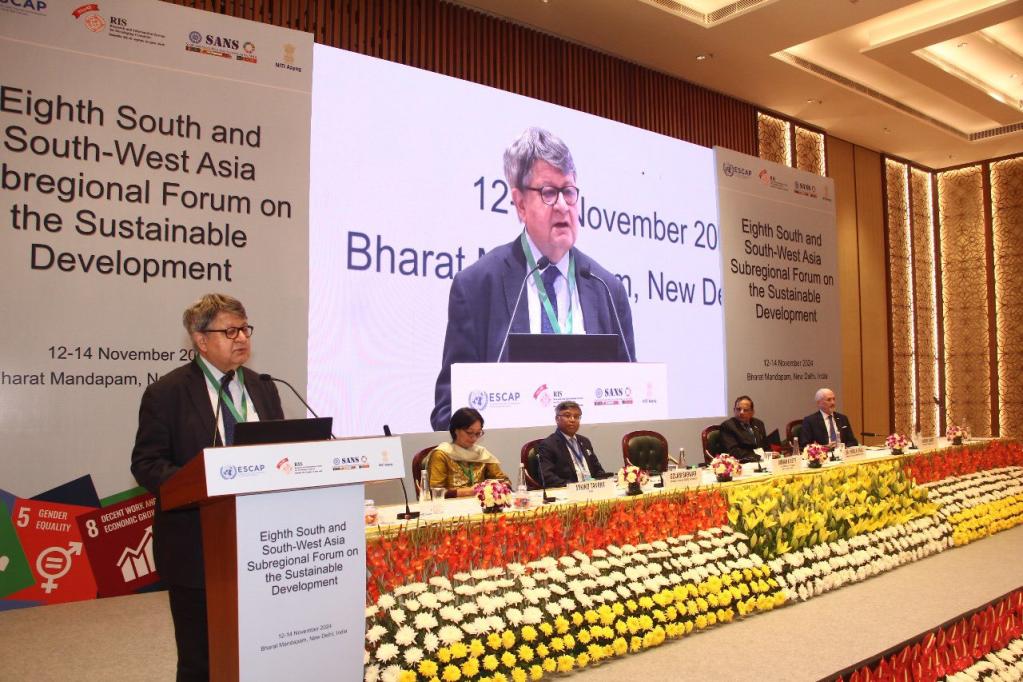
Story
14 November 2024
Sustainable cities in focus at World Urban Forum
The Twelfth Session of the World Urban Forum (WUF12) took place in Cairo from November 4 to 8, 2024, attracting over 25,000 participants to discuss practical solutions for sustainable urban development. The event, themed 'It All Starts at Home: Local Actions for Sustainable Cities and Communities,' brought together a diverse group of attendees, including policymakers, urban planners, and grassroots activists, to address critical urban challenges such as housing shortages, climate resilience, and inclusivity.UN-Habitat Executive Director Anáclaudia Rossbach opened the forum with a strong call to action, stating that “local solutions are essential to address the unique needs of our communities.” This message was echoed by Egyptian President Abdel Fattah El-Sisi, who emphasized the importance of collaboration in urban development. The Centre for Sustainable Urban Livelihoods (CSUL), conceptualized by UN Women and the National Institute of Urban Affairs, was formally launched at the forum by the Ministry of Housing and Urban Affairs, Government of India. The centre will serve as a Centre of Excellence under DAY-National Urban Livelihood Mission (NULM) and PM SVANidhi to provide technical support in effective implementation of urban livelihoods component of the mission and will facilitate cross learning and knowledge dissemination. A key session at the forum, the ONE-UN Panel titled 'Mainstreaming Leave No One Behind in India,' — helmed by the UN Resident Coordinator Office in India, UN Women India and UN-Habitat India — underscored the importance of incorporating marginalized voices, especially women and people with disabilities, into urban planning. Experts cautioned that excluding these groups from decision-making could lead to policies that perpetuate inequality. In line with this, a training session titled 'Gender and Disability Inclusion in Urban Infrastructure' equipped urban practitioners with tools for conducting accessibility audits, emphasizing that inclusive infrastructure is vital for equitable living conditions. Another significant discussion was the Urban Library session on 'Building Inclusive Cities through Technology and Youth Engagement,' which highlighted how technology can empower young people to take an active role in shaping their communities. The program featured 37 main sessions and over 700 partner-led events, covering various urban issues such as housing affordability and climate action. The Urban Expo was another highlight, showcasing over 140 exhibitors with innovative solutions like renewable energy projects and sustainable public spaces. With participants from over 182 countries, WUF12 highlighted the need for localized solutions to enhance urban resilience. Notably, 74% of delegates came from Africa, marking a significant level of regional representation. The forum achieved gender parity among speakers, with 201 male and 206 female representatives, demonstrating a commitment to inclusivity. The closing ceremony saw the launch of the Cairo Call to Action, a document encapsulating key messages from the discussions, as Egypt passed the baton to Azerbaijan, the host of the next edition of the forum.
1 of 5
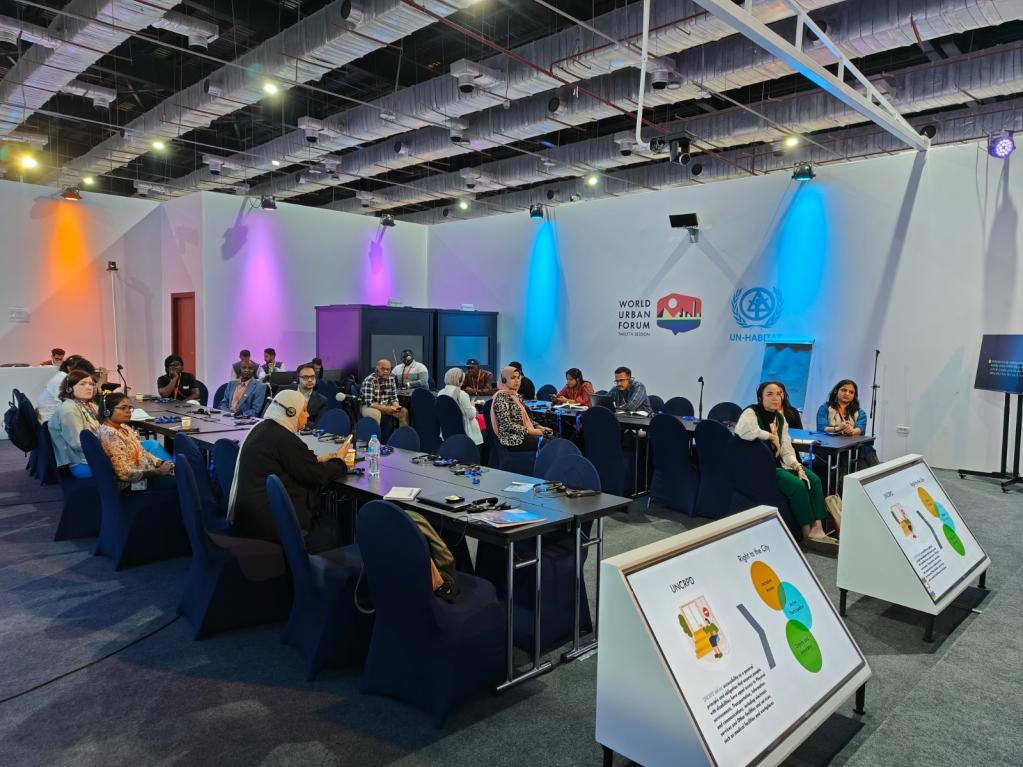
Story
12 November 2024
Baku climate summit: Earth's last chance?
In the heart of Baku, Azerbaijan, the 29th United Nations Climate Change Conference, known as COP29, has commenced, drawing global leaders, activists, and citizens alike to confront one of humanity's most pressing challenges: climate change.COP29, running from 11-22 November, arrives at a moment when the climate crisis has moved from abstract threat to lived reality. The stakes have never been higher. The summer of 2024 has shattered temperature records, while floods and fires have wreaked havoc across continents. The urgency surrounding climate action has reached a critical point. Recent reports from the Intergovernmental Panel on Climate Change (IPCC) indicate that global average temperatures are approaching 1.5°C above pre-industrial levels. Without immediate and significant cuts to greenhouse gas emissions, we could be on track for a catastrophic rise of 2.6 to 3.1°C this century. In this context, COP29 has been aptly dubbed the "Finance COP," as securing financial commitments for climate initiatives in developing nations will be a top priority. An estimated $2 trillion is needed annually by 2030 for these countries to effectively combat climate change and transition to sustainable energy sources. As delegates gather in Baku, they are reminded that time is running out. The window of opportunity to limit global warming to 1.5°C is closing rapidly. UN Secretary-General António Guterres has emphasized this urgency, stating that “COP29 must tear down the walls of climate finance. Developing countries must not leave Baku empty-handed.”The COP29 Presidency has articulated a dual approach: enhancing ambition through transparent national plans and enabling action via robust financial mechanisms. In his opening remarks, Mukhtar Babayev, COP29 President-Designate, emphasized that "climate action is a common commitment that requires leadership from everyone." As discussions unfold over these two weeks, the world watches closely, hopeful that this summit will mark a significant turning point in our collective efforts—a fight we cannot afford to lose if we wish to secure a sustainable future for our planet and its inhabitants.The annual UN Climate Change Conferences are the world’s primary multilateral decision-making forum on climate change, bringing together almost every country on Earth.
1 of 5
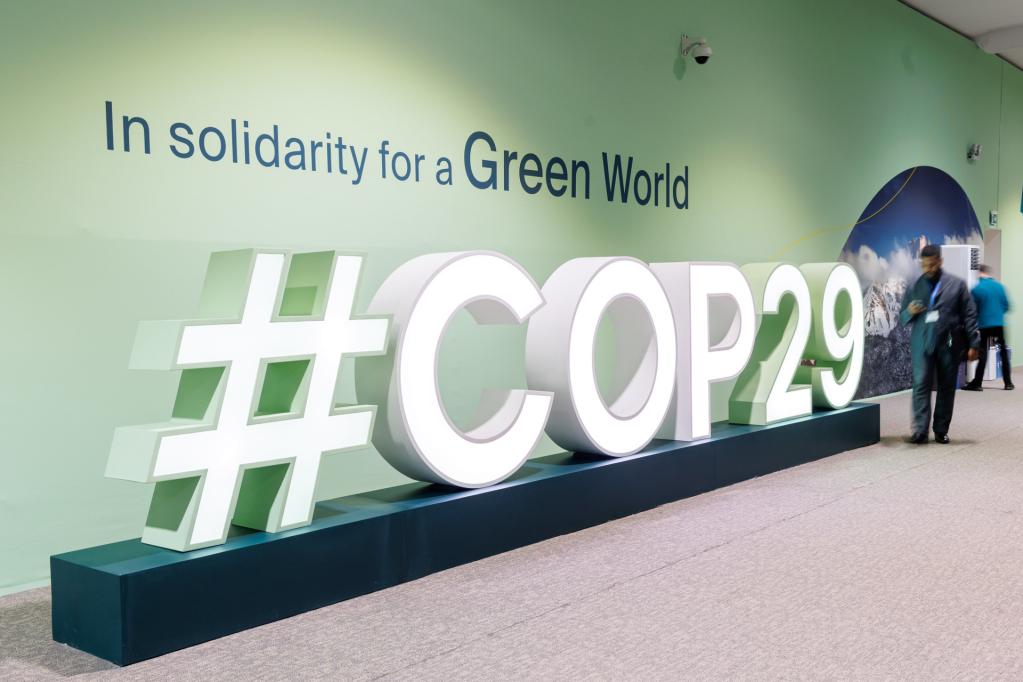
Story
04 November 2024
Celebrating India’s progress at UN Day event
The intertwined progress of the United Nations and India over the past eight decades was the focus of a special celebration held at UN House in New Delhi to mark the annual United Nations Day.More than 400 guests — including government officials, academics, civil society leaders, private sector representatives, disability advocates, journalists, SDG changemakers, and current and former UN staff -— attended a UN Day reception.UN Day, which falls each year on 24 October, marks the anniversary of the entry into force of the UN Charter in 1945. India was one of the Organization’s founding Member States, even before it became an independent country. The UN’s Resident Coordinator in India, Shombi Sharp, told the assembled guests that the partnership between India and the UN was “extraordinary and growing… both here in India and at the global level.”He said the UN was privileged to “play a small, a humble part in this amazing India story”, citing progress on multiple development fronts, including access to health care, financial inclusion, greater food security and improving conditions for persons with disabilities.
Minister of State for Skill Development & Entrepreneurship and the Minister of State for Education, Jayant Chaudhary, who served as Chief Guest, told the event that he was proud of the long-standing UN collaboration with India.He noted that India was ready to work with the UN to find solutions not just for India, but for the world, stressing New Delhi’s extensive involvement already in South-South cooperation projects. A global message recorded by UN Secretary-General António Guterres for UN Day was played to the crowd, as was a new video showcasing the work and history of the UN in India.The speeches and videos were followed by two special artistic moments: performances of chhau and garbha, dance forms that have both been inscribed on UNESCO’s List of Intangible Cultural Heritage.
Minister of State for Skill Development & Entrepreneurship and the Minister of State for Education, Jayant Chaudhary, who served as Chief Guest, told the event that he was proud of the long-standing UN collaboration with India.He noted that India was ready to work with the UN to find solutions not just for India, but for the world, stressing New Delhi’s extensive involvement already in South-South cooperation projects. A global message recorded by UN Secretary-General António Guterres for UN Day was played to the crowd, as was a new video showcasing the work and history of the UN in India.The speeches and videos were followed by two special artistic moments: performances of chhau and garbha, dance forms that have both been inscribed on UNESCO’s List of Intangible Cultural Heritage.
1 of 5
Press Release
01 November 2024
Statement by the President of the General Assembly, H.E Philemon Yang on Israeli legislation on UNRWA
I am deeply alarmed by the Israeli Parliament’s adoption of two laws which, if implemented, will prevent the United Nations Relief and Works Agency for Palestine Refugees in the Near East (UNRWA) from undertaking its essential work in Gaza and in the occupied West Bank, including East Jerusalem.UNRWA, an agency directly established and mandated by the United Nations General Assembly in its resolution 302 (IV) of 18 December 1949, plays a critical role in providing protection, shelter, food, water, and medical care to millions of Palestinian refugees in Gaza, the occupied West Bank, Lebanon, Jordan and Syria. A collapse of UNRWA operations in the Occupied Palestinian Territory as a result of these two laws would exacerbate an already catastrophic humanitarian situation. This is unacceptable.The United Nations Secretary-General has also brought this matter to the attention of the General Assembly, which underscores the gravity of the situation.I urgently call on the Government of Israel to abide by UN resolutions and to allow UNRWA to continue its indispensable work.[END]
1 of 5
Press Release
27 November 2024
High-level meeting to mark the 25th anniversary of the International Day for the Elimination of Violence against Women
I am pleased to convene this High-level meeting commemorating the twenty-fifth anniversary of the International Day for the Elimination of Violence against Women.Let us remember the tragedy that inspired the proclamation of this day.In 1960, the Mirabal sisters were brutally assassinated for their courageous activism and resistance to oppression.They became symbols of the pervasive scourge of violence against women worldwide. This scourge continues to upend the lives of millions of women and girls today.Too often, this violence is rooted in and exacerbated by a deep-seated gender inequality and regressive social attitudes toward women and girls. We must be far more resolute in combating this violence, and act with greater urgency than in the past. Let us use this International Day as an opportunity to exchange best practices, identify critical gaps, and strengthen our commitment to prevent and eliminate violence against women and girls.The international community has made historic strides in the right direction. In 1979, we adopted the Convention on the Elimination of All Forms of Discrimination Against Women.
This was an affirmation that women’s rights are human rights.
The Convention commits signatories to eliminate discrimination, promote gender equality, and empower women worldwide.The 1993 Declaration on the Elimination of Violence Against Women and the 1995 Beijing Declaration and Platform for Action further prioritized ending violence as essential to achieving gender equality.These are milestones that have led to the adoption in several countries of national legislation aimed at empowering women, ending gendered violence, and providing vital support to survivors.Yet today, a lack of adequate enforcement or political will limits the impact of these measures.Women and girls are still being killed and battered because of their gender.Women who play a role in the public sphere, including in politics, still face violence both online and offline, with some attacks proving fatal.Globally, an estimated 736 million women—nearly one in three—have experienced physical or sexual violence, or both, at least once in their lives.This is unacceptable!We must actively promote policies and programmes that address the root causes of violence against women and girls, striving toward true gender equality.We must end discriminatory laws and social norms. We must also implement robust legal frameworks and policies to fully uphold gender equality and women’s rights.Men and boys have an important role in this fight. They are allies who must introspect on what they can do better. Moreover, they must take proactive steps to change discriminatory attitudes toward women and prevent violence against them.It is our collective responsibility to do so too.In the Pact for the Future, Member States reaffirmed their commitment to the Beijing Declaration and Platform for Action, reinforcing their efforts to achieve gender equality,To advance women’s participation in all spheres of life,To fully empower women and girls, And to eliminate all forms of discrimination and violence targeting them.I wholeheartedly support the urgent implementation of these commitments. Broadly, I will continue to champion gender equality in the work of the General Assembly, especially as we prepare to celebrate the 30th anniversary of the Beijing Declaration next year.I will participate in the 16 Days of Activism against Gender-Based Violence, beginning today and concluding on Human Rights Day, on 10 December.And I will also reestablish the Advisory Board on Gender Equality to guide our efforts within the work of the General Assembly, and beyond.The thirtieth anniversary of the Beijing Declaration and Platform for Action will be a crucial opportunity to further integrate these efforts into our pursuit of the Sustainable Development Goals.Let us use this moment to strengthen our resolve and work together to secure a world free from violence for all women and girls.Thank you.[END]
This was an affirmation that women’s rights are human rights.
The Convention commits signatories to eliminate discrimination, promote gender equality, and empower women worldwide.The 1993 Declaration on the Elimination of Violence Against Women and the 1995 Beijing Declaration and Platform for Action further prioritized ending violence as essential to achieving gender equality.These are milestones that have led to the adoption in several countries of national legislation aimed at empowering women, ending gendered violence, and providing vital support to survivors.Yet today, a lack of adequate enforcement or political will limits the impact of these measures.Women and girls are still being killed and battered because of their gender.Women who play a role in the public sphere, including in politics, still face violence both online and offline, with some attacks proving fatal.Globally, an estimated 736 million women—nearly one in three—have experienced physical or sexual violence, or both, at least once in their lives.This is unacceptable!We must actively promote policies and programmes that address the root causes of violence against women and girls, striving toward true gender equality.We must end discriminatory laws and social norms. We must also implement robust legal frameworks and policies to fully uphold gender equality and women’s rights.Men and boys have an important role in this fight. They are allies who must introspect on what they can do better. Moreover, they must take proactive steps to change discriminatory attitudes toward women and prevent violence against them.It is our collective responsibility to do so too.In the Pact for the Future, Member States reaffirmed their commitment to the Beijing Declaration and Platform for Action, reinforcing their efforts to achieve gender equality,To advance women’s participation in all spheres of life,To fully empower women and girls, And to eliminate all forms of discrimination and violence targeting them.I wholeheartedly support the urgent implementation of these commitments. Broadly, I will continue to champion gender equality in the work of the General Assembly, especially as we prepare to celebrate the 30th anniversary of the Beijing Declaration next year.I will participate in the 16 Days of Activism against Gender-Based Violence, beginning today and concluding on Human Rights Day, on 10 December.And I will also reestablish the Advisory Board on Gender Equality to guide our efforts within the work of the General Assembly, and beyond.The thirtieth anniversary of the Beijing Declaration and Platform for Action will be a crucial opportunity to further integrate these efforts into our pursuit of the Sustainable Development Goals.Let us use this moment to strengthen our resolve and work together to secure a world free from violence for all women and girls.Thank you.[END]
1 of 5
Press Release
27 November 2024
International Day of Persons with Disabilities
This year’s International Day of Persons with Disabilities reminds us that we need the leadership of persons with disabilities more than ever.Persons with disabilities already disproportionately bear the brunt of the crises scarring our world -- from conflicts and climate disasters, to poverty and inequalities -- because of persistent discrimination, stigma and barriers to basic rights and services.But, they are also often denied their right to contribute to solutions to these crises. Through the recently adopted Pact for the Future, the countries of the world committed to correcting this injustice for persons with disabilities of all ages, for present and future generations.This includes recognizing the essential role of persons with disabilities in shaping the future of digital and assistive technologies -- such as those powered by artificial intelligence -- driving change across communities and advocating for their rightful place in decision-making processes that affect their lives.Next year’s World Summit for Social Development will be a key moment to carry these and other commitments forward. In every community, persons with disabilities are changemakers and peacemakers.They are also leaders. On this important day, and every day, let’s work with persons with disabilities to achieve an inclusive and sustainable future for all people.[END]For more information and resources at the following link: https://www.un.org/en/observances/day-of-persons-with-disabilities
1 of 5
Press Release
27 November 2024
Middle East - 2024
The Secretary-General welcomes the successful conclusion of the fifth session of the Conference on the Establishment of a Middle East Zone Free of Nuclear Weapons and Other Weapons of Mass Destruction, which took place from 18 – 22 November 2024 at the United Nations Headquarters in New York.The work of this Conference is critical to building a more peaceful future for all people -- in the Middle East and around the world. The Secretary-General commends the participating States of the Conference, under the Presidency of Mauritania, on their constructive engagement towards the elaboration of a future treaty and their commitment to diplomacy and multilateral solutions at a time of ongoing heightened tensions and the acute humanitarian crisis in the Middle East region.He encourages the participating States to continue working constructively during the intersessional period, and supports their continuing efforts to pursue, in an open and inclusive manner, the establishment of a Middle East Zone Free of Nuclear-Weapons and Other Weapons of Mass Destruction. He congratulates Morocco, with best wishes for success, on its endorsement as the President of the sixth session.[END]
1 of 5
Press Release
27 November 2024
India: NCERT-UNODC RiseUp4Peace consultation unites policymakers, educators and young people to champion education for peace, lawfulness and inclusion
Today, young people face critical challenges—mental health, cyber risks, drug use, violence, among others. Responding to this right from the classrooms is “a need of the hour,” educators say. India’s National Education Policy (NEP) 2020 and the National Curriculum Framework (NCF) 2023 both recognize the need to nurture responsible citizens who can contribute to peace and harmony in an increasingly complex world. But this ambition goes beyond the traditional scope of education—it requires reimagining educational interventions in classrooms, schools, and communities.In the bustling classrooms and vibrant schoolyards across India, there is a powerful movement quietly taking shape—one that champions peace, lawfulness and inclusion through education. At the heart of this movement are not just the policymakers, educators, or institutions, but young people who stand as the most crucial catalysts of change. Bridging theory with practice, UNODC’s RiseUp4Peace educational initiative is focused on engaging and empowering young people to resist negative influences, emerging vulnerabilities and risky behaviors. Emphasising the initiative’s relevance and impact, over 70 policymakers, educators and young champions ideated and charted a roadmap for fostering peace, inclusion, and lawfulness in education--as envisioned in NEP 2020 and NCF 2023—at a RiseUp4Peace policy consultation convened by India’s apex curriculum body, the National Council of Educational Research and Training (NCERT) and UNODC South Asia in New Delhi. Working in mixed groups, policymakers, educators and students exchanged practical insights on curriculum integration, good practices and new ideas, as well as the way forward. Key insights shared by educators emphasized the importance of a holistic approach to education.United Nations India Resident Coordinator Shombi Sharp highlighted the immense potential of India’s 265.2 million students as catalysts for change, emphasizing the importance of quality, values-driven education in shaping inclusive and peaceful societies. “Education is the cornerstone for peace, inclusion, and resilience. Together, we must ensure every child thrives in a safe, empowering environment.”Launched this year, the cross-cutting collaborative initiative has engaged over 30,000+ stakeholders across 14 states and UTs through participatory capacity building of educators, co-creation of school-led initiatives, and activity-based learning of students. RiseUp4Peace has spurred innovative interventions blending arts, tech, and sports to empower students, with support of a diverse set of partners: public, private and rural schools, NCERT, DERT Meghalaya, Raipur Police and educator and youth groups. Dr. Amarendra Prasad Behera, Joint Director, NCERT urged educators to actively build capacities and develop values-driven modules to transform education. “NEP 2020 and NCF 2023 envision education as a bridge to a more just and peaceful society. Such collaborations transform vision into action.” UNODC Regional Representative Marco Teixeira underscored the vulnerabilities of youth to drugs, mental health challenges, and risky behaviors, advocating for educational interventions that prioritize integrity, resilience, and lawfulness. UNODC Deputy Representative for South Asia, Dr. Suruchi Pant highlighted that “a whole-of-society approach is essential to empower students and ensure they have the support needed to thrive.”Young people also shared their lived experiences, bringing attention to the importance of providing platforms for mental health awareness, gender equality, inclusion, lawfulness, and cyber safety. Ms. Aarushi Gambhir, a passionate advocate for disability inclusion and RiseUp4Peace champion, emphasized that "classrooms are where disability inclusion must truly begin," further stressing the need for inclusive education from the ground up. Equipped with trainings, tools, monthly activity plans and continuous cross-learning, a growing number of educators are integrating important themes pertaining to SDG16 in classroom programs with RiseUp4Peace. Schools are leading change with creative outputs with street plays, music, art, AI-tools and school-wide projects on anti-bullying, cyber safety, drug use prevention and gender equality. Student-led conversations and advocacy efforts through vlogs, posters, social work and peer-centered activities are responding to emerging realities from classrooms. The result? “Young learners resonating with a critical challenge, identifying solutions and responses, sharpening their own unique skills and developing a sense of empathy, leadership and social responsibility,” said Ms. PK Dhillon, Principal, KNPS Phagwara (Punjab). The consultation reinforced the call for a whole-of-society approach to education, with policymakers, educators and students as equal partners in creating a roadmap to promote transformative education for SDG16. UNODC’s Communications Officer for South Asia, Mr. Samarth Pathak, summarized the impact of the initiative which has spanned across India’s diverse regions. "With RiseUp4Peace, educators and students are not just learning about peace, lawfulness, and inclusion—they are actively working toward it.”For more details, please contact: Mr. Samarth PathakCellphone: +91-9811347927Communications Officer (South Asia)Email: samarth.pathak@un.orgUNODCWebsite: www.unodc.org/southasiaNew Delhi, IndiaX: @UNODC_ROSA/@PathakSamarth
1 of 5
Latest Resources
1 / 11
1 / 11


